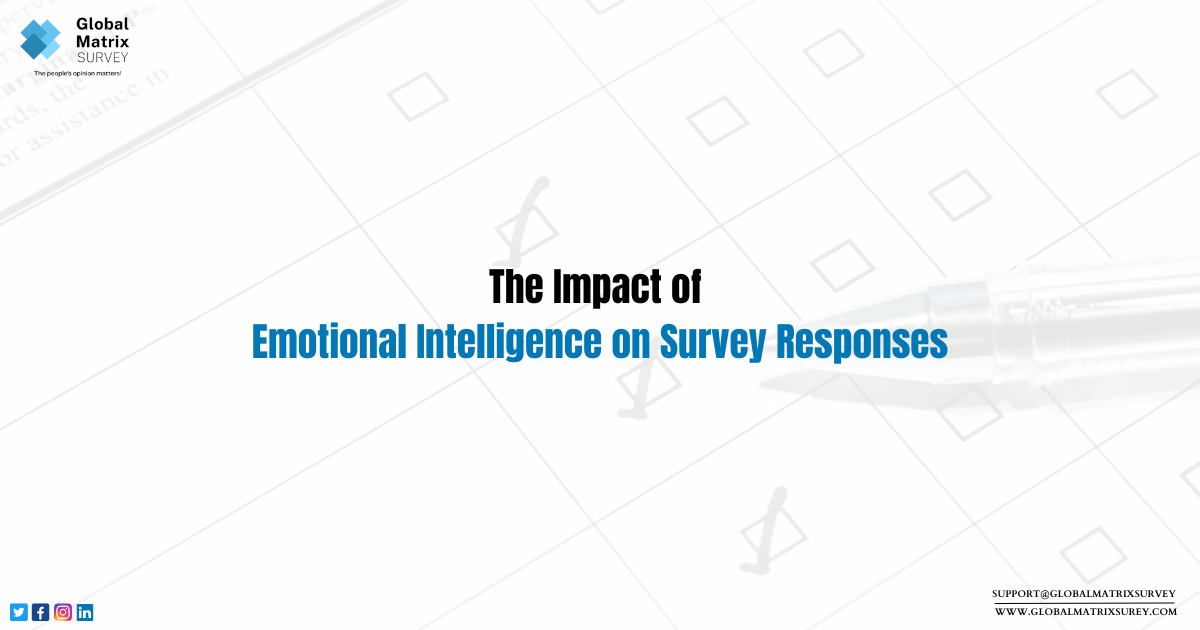Blog | Sat, 10 Aug 24
The Impact of Emotional Intelligence on Survey Responses
Emotional intelligence (EI) refers to the ability to recognize, understand, and manage one’s own emotions and the emotions of others. In surveys, emotional intelligence plays a significant role in shaping how respondents interpret questions, process information, and ultimately provide answers. Here's a closer look at how emotional intelligence impacts survey responses and what you can do to account for it in your survey design.

The Impact of Emotional Intelligence on Survey Responses
Emotional intelligence (EI) refers to the ability to recognize, understand, and manage one’s own emotions and the emotions of others. In surveys, emotional intelligence plays a significant role in shaping how respondents interpret questions, process information, and ultimately provide answers. Here's a closer look at how emotional intelligence impacts survey responses and what you can do to account for it in your survey design.
1. Emotional Self-Awareness
Respondents with high emotional self-awareness are more attuned to their feelings and may provide more accurate and reflective answers. They are likely to understand how their emotions influence their perceptions and decisions.
- Impact: These respondents might take more time to consider their answers, leading to more thoughtful and honest responses.
- Consideration: Surveys that encourage reflection, perhaps through open-ended questions, can benefit from the input of emotionally self-aware respondents.
2. Empathy
Empathy, a core component of emotional intelligence, allows individuals to understand and share the feelings of others. This can influence how respondents perceive survey questions, particularly those related to social issues or customer service.
- Impact: Empathetic respondents may answer in a way that they believe aligns with the feelings or experiences of others, sometimes at the expense of their true feelings.
- Consideration: To mitigate this, ensure questions are phrased neutrally and encourage respondents to focus on their personal experiences and opinions.
3. Social Awareness and Social Desirability Bias
Socially aware individuals are more attuned to social norms and expectations, which can lead to social desirability bias—a tendency to answer questions in a way that others will view favorably.
- Impact: This can result in over-reporting of socially acceptable behaviors or under-reporting of behaviors that may be viewed negatively.
- Consideration: Anonymity in surveys can help reduce this bias by making respondents feel more comfortable providing honest answers without fear of judgment.
4. Emotional Regulation
Regulating emotions can influence how respondents deal with survey questions that may evoke strong feelings, such as questions about personal experiences, sensitive topics, or negative feedback.
- Impact: Those with strong emotional regulation may provide more balanced and less emotionally charged responses, even when discussing potentially upsetting topics.
- Consideration: Surveys should be designed with sensitivity in mind, especially when asking about personal or potentially triggering topics. Providing context or allowing respondents to skip certain questions can help.
5. Mood and Response Patterns
A respondent’s current mood can significantly influence their survey responses. Positive moods may lead to more favorable responses, while negative moods could result in harsher evaluations.
- Impact: A respondent’s emotional state at the time of the survey can introduce variability and affect the consistency of responses.
- Consideration: Consider including questions that assess the respondent’s current mood or state of mind, or surveying at different times to account for mood variations.
6. Interpersonal Relationships and Survey Responses
In surveys that ask about relationships, such as employee satisfaction or customer service evaluations, respondents with high EI may be more considerate of the feelings of others involved, which could influence their responses.
- Impact: These respondents might avoid giving negative feedback if they believe it could harm someone they care about or respect.
- Consideration: Emphasize the importance of honest feedback for improvement and ensure confidentiality to encourage candid responses.
7. Motivation and Engagement
Emotionally intelligent respondents may have a higher intrinsic motivation to complete the survey thoughtfully, especially if they understand the purpose and value of their input.
- Impact: These respondents are more likely to engage fully with the survey, providing detailed and considered responses.
- Consideration: Communicate the importance of the survey and how the results will be used, to motivate all respondents to participate fully.
Strategies to Account for Emotional Intelligence in Surveys
- Design Balanced Questions: Ensure questions are clear, neutral, and balanced to minimize emotional triggers that could skew responses.
- Encourage Reflection: Include open-ended questions that allow for thoughtful responses, which can be particularly beneficial for emotionally intelligent respondents.
- Ensure Anonymity: To reduce social desirability bias, guarantee that responses are anonymous, allowing respondents to answer more freely.
- Monitor Mood: Consider asking about the respondent’s current emotional state to understand how it might influence their responses.
Conclusion
Emotional intelligence significantly impacts how individuals respond to surveys. By understanding and accounting for these effects, you can design surveys that yield more accurate, reliable, and insightful data. Recognizing the role of EI helps in crafting better questions, interpreting responses more effectively, and ultimately using survey data to make informed decisions that reflect the true sentiments of your audience.

